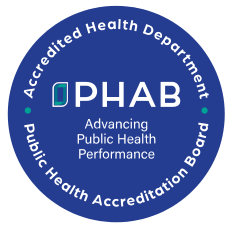
The Massachusetts Department of Public Health (DPH) is accredited by the Public Health Accreditation Board (PHAB). DPH achieved initial accreditation status from PHAB on November 14, 2017, following a rigorous, multi-faceted peer-reviewed assessment process to ensure it meets or exceeds a set of PHAB standards and measures. DPH received PHAB reaccreditation on May 14, 2025.
Accreditation is a significant achievement. PHAB, the national accreditation program, jointly supported by the Centers for Disease Control and Prevention and the Robert Wood Johnson Foundation, sets standards against which the nation’s more than 3,000 governmental public health departments can continuously improve the quality of their services and performance. National public health accreditation aims to improve and protect the health of the public by advancing the quality and performance of state, tribal, and local health departments.
What does accreditation mean?
The accreditation process has challenged DPH to think critically about the way we work to protect and promote the health of the Commonwealth. It allows us to identify processes where improvements are needed, and it has given us the opportunity to strengthen our culture of continuous quality improvement. Public health accreditation reinforces the role of health departments and partners in delivering the 10 essential public health services. To maintain accreditation, reports are submitted each year after the initial approval, and departments must be reaccredited approximately every five years.
Key accreditation documents
There are several documents and dynamic tools that are essential to be reaccredited by the Public Health Accreditation Board. The documents include:
- 2024 Strategic Plan to Advance Racial Equity
- 2024 State Health Assessment
- 2024 State Health Improvement Plan
Past accreditation documents
2017 Massachusetts State Health Assessment (SHA)
The 2017 MA State Health Assessment is a report on the health of the citizens of the Commonwealth grounded in data from existing DPH data sets, external data sources such as US Census, CDC, and other state agencies as well as through the Statewide Partnership Advisory group, focus group input, existing DPH advisory group input, key informant interviews, and the general public.
DPH, in collaboration with our colleagues across the Commonwealth, is dedicated to understanding the social determinants that contribute to the disparities highlighted in the 2017 State Health Assessment. Collecting data on how these factors shape existing and emerging health issues helps us understand what we can do as a Commonwealth to make Massachusetts an even healthier place to live.
Massachusetts has always been a leader in tackling some of our toughest public health problems through the use of innovative, evidence-based strategies. This assessment is a foundation for developing the next set of great ideas and strategies to ensure optimal health for all residents of this great Commonwealth, particularly for those in our most vulnerable communities.
2014 State Health Improvement Plan (SHIP)
The 2014 State Health Improvement Plan PDF | Doc is based on a comprehensive data analysis and has served as a blueprint for policy and program initiatives to prevent injury and disease, promote wellness and health equity, and protect state residents from health risks. The plan demonstrates how public health prevention efforts can be instrumental in achieving health care reform and emphasizes reduction of health disparities.
The SHIP identifies priorities for public health system improvement, establishes goals, SMART objectives, and sound performance measures to address key public health priorities over time. The SHIP charts a direction for health improvement efforts in Massachusetts and is organized around these seven health outcome domains.
DPH's Office of Performance Management and Quality Improvement (PMQI) is responsible for providing leadership and coordinating department-wide initiatives that seek to continually improve the quality and performance of programs, services, and processes within the Department in order to ensure continued accreditation status. In addition, this office provides technical assistance to local health departments interested in maintaining and achieving public health accreditation.
For additional information contact the Accreditation Coordinator.